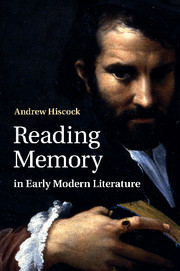Book contents
- Frontmatter
- Contents
- Figures
- Acknowledgements
- Introduction: ‘the dark backward and abysm of time’
- Chapter 1 ‘To seke the place where I my self hadd lost’: acts of memory in the poetry of Henry Howard, Earl of Surrey
- Chapter 2 ‘Remembre not (lorde) myne offences’: Katherine Parr and the politics of recollection
- Chapter 3 ‘Better a few things well pondered, than to trouble the memory with too much’: troubling memory and martyr in Foxe’s Acts and Monuments
- Chapter 4 Text, recollection and Elizabethan Fiction: Nashe, Deloney, Gascoigne
- Chapter 5 The Doleful Clorinda? Mary Sidney, Countess of Pembroke, and the vocation of memory
- Chapter 6 ‘Tell me where all past yeares are’: John Donne and the obligations of memory
- Chapter 7 ‘Of all the powers of the mind … the most delicate and fraile’: the poetry of Ben Jonson and the renewal of memory
- Chapter 8 ‘This art of memory’: Francis Bacon, memory and the discourses of power
- Notes
- Select Bibliography
- Index
Chapter 7 - ‘Of all the powers of the mind … the most delicate and fraile’: the poetry of Ben Jonson and the renewal of memory
Published online by Cambridge University Press: 05 April 2014
- Frontmatter
- Contents
- Figures
- Acknowledgements
- Introduction: ‘the dark backward and abysm of time’
- Chapter 1 ‘To seke the place where I my self hadd lost’: acts of memory in the poetry of Henry Howard, Earl of Surrey
- Chapter 2 ‘Remembre not (lorde) myne offences’: Katherine Parr and the politics of recollection
- Chapter 3 ‘Better a few things well pondered, than to trouble the memory with too much’: troubling memory and martyr in Foxe’s Acts and Monuments
- Chapter 4 Text, recollection and Elizabethan Fiction: Nashe, Deloney, Gascoigne
- Chapter 5 The Doleful Clorinda? Mary Sidney, Countess of Pembroke, and the vocation of memory
- Chapter 6 ‘Tell me where all past yeares are’: John Donne and the obligations of memory
- Chapter 7 ‘Of all the powers of the mind … the most delicate and fraile’: the poetry of Ben Jonson and the renewal of memory
- Chapter 8 ‘This art of memory’: Francis Bacon, memory and the discourses of power
- Notes
- Select Bibliography
- Index
Summary
But to restore great things is sometimes not only a harder but a nobler task than to have introduced them.
Erasmus, Letter ‘To Leo X’, 384Memory, of all the powers of the mind, is the most delicate, and fraile: it is the first of our faculties, that Age invades. Seneca, the father, the Rhetorician, confesseth of himselfe, hee had a miraculous one; not only to receive, but to hold. I my selfe could in my youth, have repeated all, that ever I had made; and so continued, till I was past fortie: Since, it is much decay’d in me. Yet I can repeate whole books that I have read, and Poems, of some selected friends, which I have lik’d to charge my memory with. It was wont to be faithfull to me, but shaken with age now, and sloath (which weakens the strongest abilities) it may performe somewhat, but cannot promise much. By exercise it is to be made better, and serviceable. Whatsoever I pawn’d with it, while I was young, and a boy, it offers me readily, and without stops: but what I trust to it now, or have done of later yeares, it layes up more negligently, and often times loses.
In his commonplace book, Timber, or Discoveries, which would appear to be an accumulation of reflections dating from across the Caroline period to his death in 1637, Jonson offered a revealing portrait of what was for him the precious commodity of memory. Here, he is seen to disclose in careful detail the painful recognition of his own ageing and decline, giving particular emphasis to the process of memory and its powers to frame and, indeed, to unframe the self.
In the main, Jonson eschewed the spiritual exercise of memory that Donne investigated in his sermons, seeming rather to share the opinions of his friend Sir Henry Wotton, who pondered in later life, ‘I read, that old Men live more by Memory than by Hope’. The poet-playwright favoured an interest in the ars memorativa as it had been advocated in pagan antiquity – an art that affirmed that an ‘artificial memory’ might be trained with a regime of rigorous mental discipline. Moreover, this interest could surface in any number of unexpected places in his writings, such as in his comedy The Case is Altered (published 1609), where Francisco Colonnia submits, ‘I will be silent, yet that I may serve | But as a decade in the art of memory, | To put you still in mind of your own virtues’ (ii.iii). More generally, Roman writers such as Cicero and Quintilian, who, as we have seen, conducted such influential expositions of the rhetorical practices of sequential imaging and the requirements of retrospection for public service, were among those held in particular esteem by Jonson. Indeed, a rather piqued Drummond of Hawthornden was informed by his voluble house guest in 1618 that he should turn back to Quintilian, ‘who ([Jonson] said) would tell me all the faults of my Verses [as] if he had Lived with me’ (i.132: 12–14).
- Type
- Chapter
- Information
- Reading Memory in Early Modern Literature , pp. 192 - 218Publisher: Cambridge University PressPrint publication year: 2011



